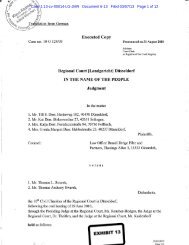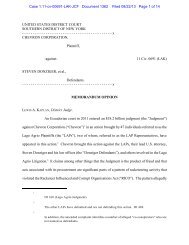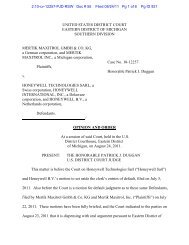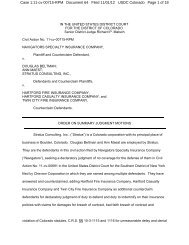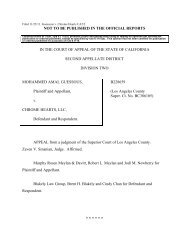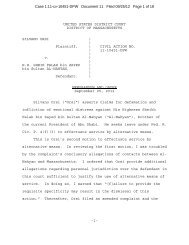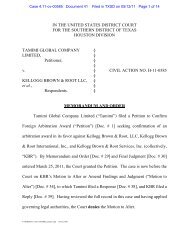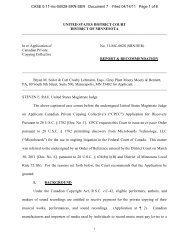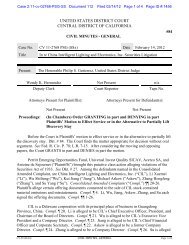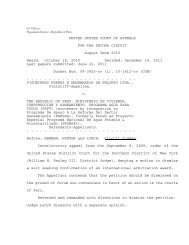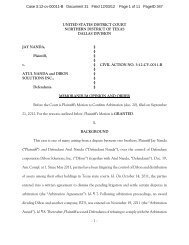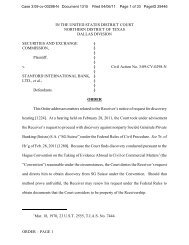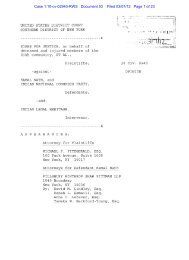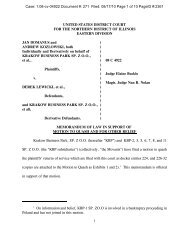Hyundai Securities Co. v. Lee (Cal. Ct. App. 2013) - Letters Blogatory
Hyundai Securities Co. v. Lee (Cal. Ct. App. 2013) - Letters Blogatory
Hyundai Securities Co. v. Lee (Cal. Ct. App. 2013) - Letters Blogatory
You also want an ePaper? Increase the reach of your titles
YUMPU automatically turns print PDFs into web optimized ePapers that Google loves.
not bar a <strong>Cal</strong>ifornia judge from confirming a foreign arbitrator panel‟s award”].) The<br />
arbitration statute explicitly provides for special procedures by specifying that “a petition<br />
under this title shall be heard in a summary way in the manner and upon notice provided<br />
by law for the making and hearing of motions, except that not less than 10 days‟ notice of<br />
the date set for the hearing on the petition shall be given.” (§ 1290.2.) The Act, which<br />
expressly requires an “action,” has no comparable provision for a summary proceeding.<br />
Unlike other special proceedings in Part 3 of the <strong>Co</strong>de of Civil Procedure, 2 the<br />
Legislature, in providing for the procedures for recognition of a foreign-country money<br />
judgment, only specified that the issue of recognition is to be raised by filing an action or<br />
by way of a counterclaim, cross-claims or affirmative defense. (§ 1718.) The Legislature<br />
set forth procedures for other special proceedings. For example, as noted, it provided for<br />
the specific summary procedures for compelling, confirming, and vacating arbitration<br />
awards (§§ 1280 et seq.), and it provided for a registration procedure for recognizing<br />
sister-state money judgments. (§§ 1710.10-1710.60.) 3<br />
The Act is contained in <strong>Co</strong>de of Civil Procedure Part 3—Of Special Proceedings<br />
of a Civil Nature. Section 22 defines an action as “an ordinary proceeding in a court of<br />
justice by which one party prosecutes another for the declaration, enforcement, or<br />
protection of a right, the redress or prevention of a wrong, or the punishment of a public<br />
offense.” Section 23 defines a special proceeding as “[e]very other remedy.” (See<br />
People v. Yartz (2005) 37 <strong>Cal</strong>.4th 529, 536.) Generally, with respect to special<br />
proceedings, the Legislature has set forth specific procedures, but the only procedure<br />
specified for recognition of a foreign-country money judgment is that it be raised by<br />
filing an action. Thus, whether recognition of a foreign-country money judgment is an<br />
2 Part 3 includes such proceedings as writs, contesting elections, contempts, eminent<br />
domain, name changes, arbitration, unclaimed property, sister-state judgments,<br />
mediation, preferences, tribal injunctions, inspection warrants, and certain proceedings<br />
against municipal corporations.<br />
3 As to procedures for other special proceedings, see, e.g., sections 1067 et seq.<br />
(writs), sections 1230.010-1268.720 (eminent domain).<br />
8



